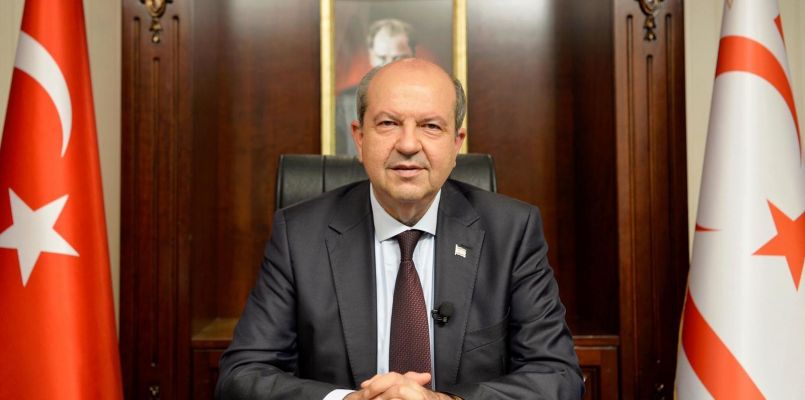President Ersin Tatar evaluates on the 57th anniversary of the unjust UN Resolution 186 that was taken on March 4, 1964, stating: “The U.S. Special Representative for Cyprus, Nelson Ledsky, had stated that this resolution was politically motivated”

President Ersin Tatar said that the “unjust” UN Resolution 186 – which was passed by the UN Security Council on March 4, 1964, is the primary reason a settlement has been prevented in Cyprus and the intransigence of the Greek Cypriot side.
President Tatar said that the resolution, passed 57 years ago, had been passed at a period when the Greek Cypriot forces were attacking the Turkish Cypriot people as part of the aspiration to unite the island of Cyprus with Greece (Enosis), in accordance with the provisions of the Akritas Plan. He said the Turkish Cypriot people had been forcefully evicted from all state organs and institutions of the Republic of Cyprus of which they were an equal co-founding partner, with massacres and genocide continuing.
A ceasefire had been secured following a fly-by of Turkish fighter jets on December 25, 1963 in the skies of Lefkoşa, in the hope that a solution could be found at the London conference that was attended by the Turkish and Greek Cypriot sides and the guarantor countries – Turkey, Greece and Britain, in January of 1964. The London conference ended without success because of the negative stance of the Greek and Greek Cypriot duo, and attacks on the Turkish Cypriot people in Cyprus intensified. In light of this development, Turkey made an application to the UN Security Council on February 13, 1964, in order to secure the safety of the Turkish Cypriot people.
The UN Security Council passed Resolution 186 dated March 4, 1964, saying it was “primarily to send UN Peace Keeping Forces to be Cyprus, to stop the bloodshed, then to deal with any issues later on, that the said resolution can be changed.” However, Resolution 186 in fact transformed the Republic of Cyprus into a Greek Cypriot Administration as the “sole legitimate government of Cyprus”.
During a meeting with TRNC Founding President, Rauf R. Denktaş, the US Special Representative for Cyprus, Nelson Ledsky, accepted that the deliberation of this resolution by the UN Security Council on March 4, 1964, was a politically motivated resolution, where he added:
“I had the 1964 documents evaluated. I have determined that the resolution passed by the UN Security Council does not have a legal basis, and was a politically motivated resolution.”
It is this very resolution, unjust in nature and passed on politically motivated grounds, that has for many years served as the primary reason for a non-solution in Cyprus and fed the intransigency of the Greek Cypriot side. Recognised as the “sole legitimate government of Cyprus,” the Greek Cypriot Administration is ignoring the political equality, sovereignty and all the rights of the Turkish Cypriot people and is making proposals that will afford minority rights to our people. The continuing isolation and embargoes and the imposition of a specific solution model under “UN parameters” emanates from this unjust resolution.
Because this resolution continues to be in force, the Greek Cypriot side is refusing to come near any possible agreement, seeing themselves as the sole owners of the whole of Cyprus, whilst continuing a hegemonic mentality. Whilst this unjust resolution remains in force, the Greek Cypriot side will not agree to any settlement.
The Greek Cypriot side, using their sole international recognition as the “sole legitimate government of Cyprus” which is emanating from the resolution, has in all negotiations processes since 1968 continued to put forward negative and uncompromising stance. This has resulted in failure of the Annan Plan referenda, and the subsequent failures in the meetings in Mont Pelerin and Crans Montana.
Whilst all of these developments have clearly evidenced that a solution based on a federation has not proven possible, we have put forward a settlement model that is based on the sovereign equality of two States that are in coexistence side-by-side in a cooperative relationship, which also conforms to the realities of Cyprus and the region. This settlement model is fully supported by the Republic of Turkey, which is the biggest and most powerful country in the region, and our proposal has also garnered international attention and is being debated.
As our preparations continue for the five-plus-UN informal meeting that will be held on April 27 to 29 in Geneva, Switzerland, we shall be putting forward the settlement model aforementioned. We are determined on this matter and we will not retract our position. Our efforts and wish is for a solution model to be realised in a manner that will be of benefit to Cyprus and the region.”

